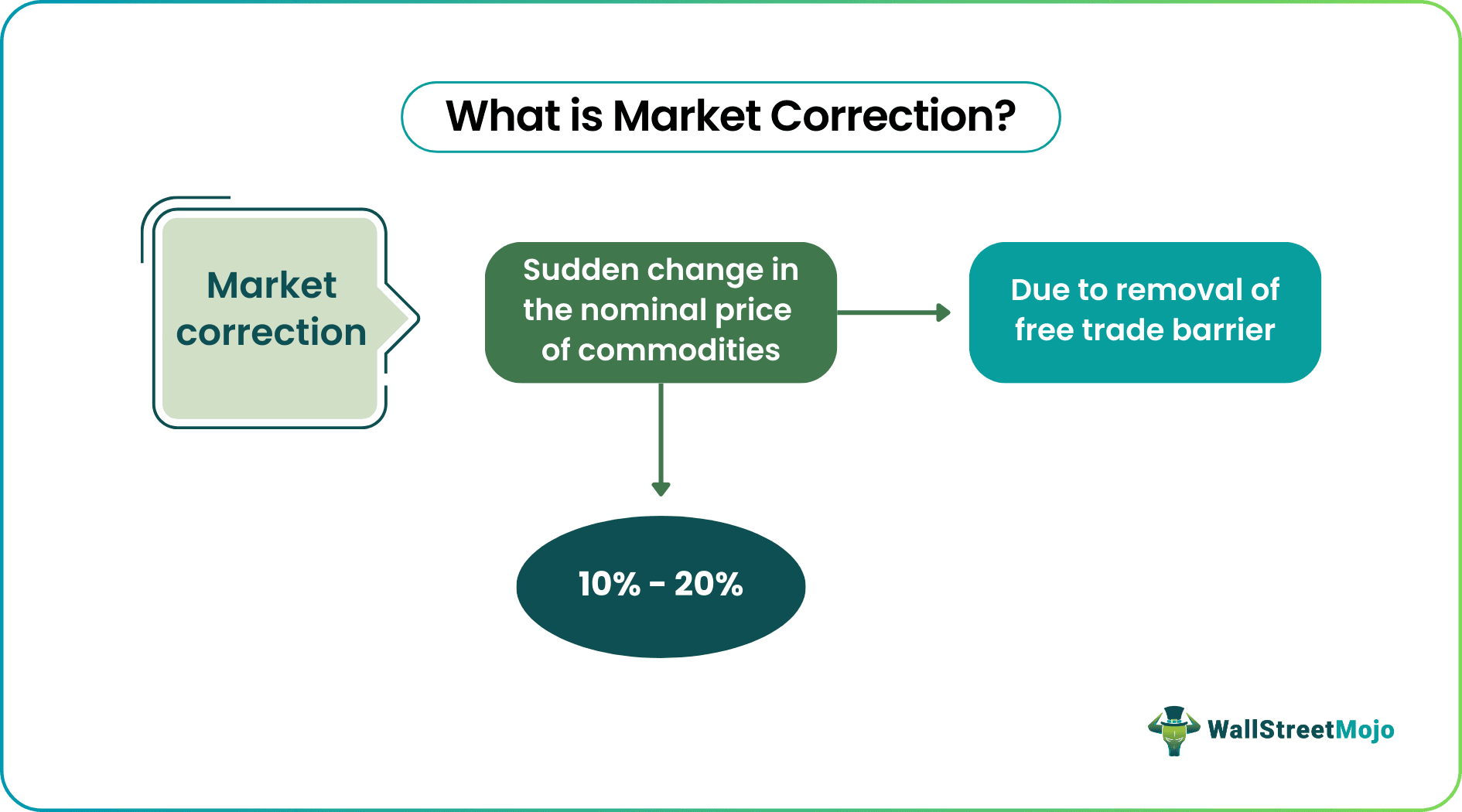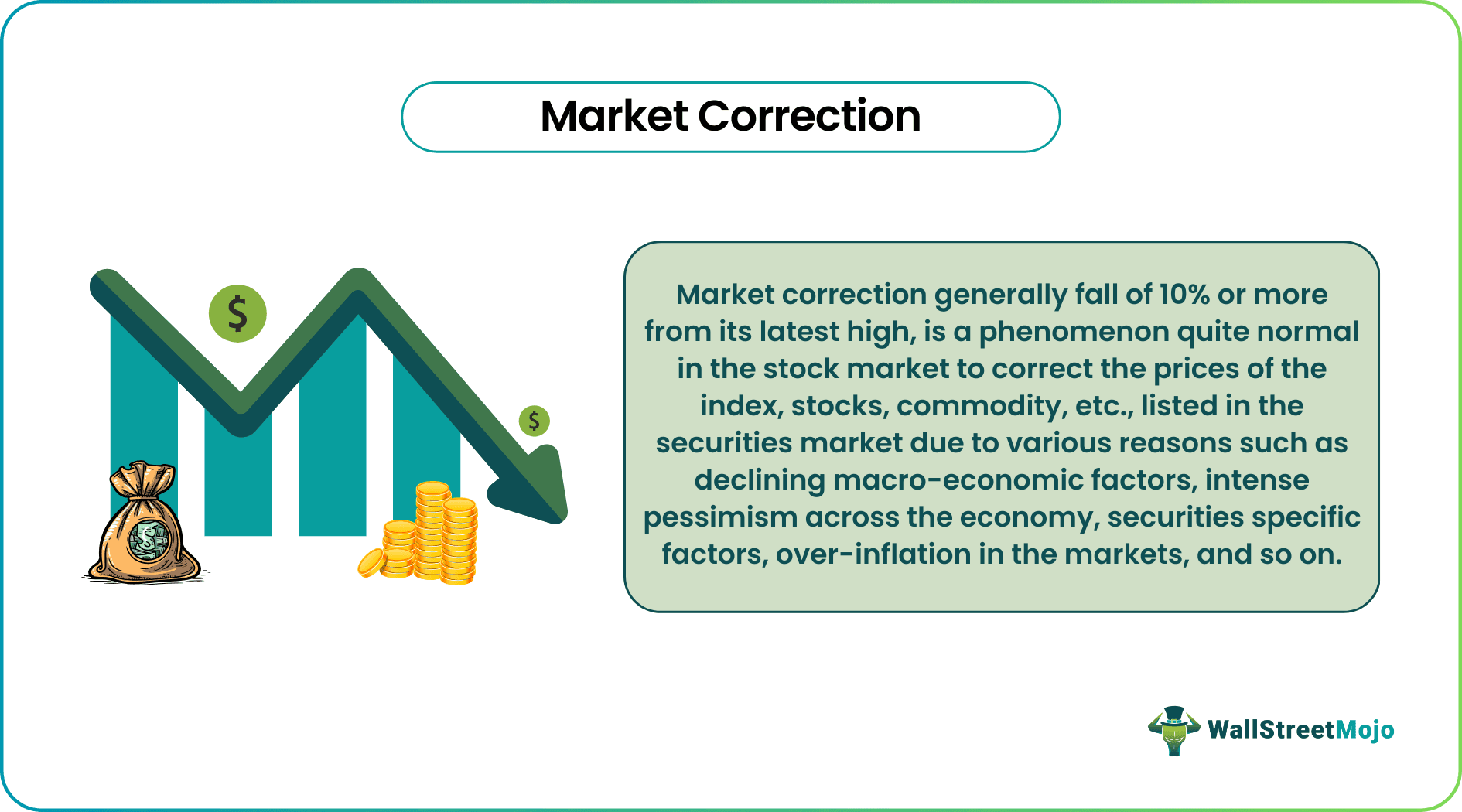Table Of Contents
Market Correction Definition
The market correction, usually referred to as a fall of 10% or more from its latest high, is a phenomenon quite normal in the stock market to correct the prices of the index, stocks, commodity, etc., listed in the securities market due to various reasons such as declining macro-economic factors, intense pessimism across the economy, securities specific factors, over-inflation in the markets, and so on.

Though the prolonged market correction is painted in a negative color due to various reasons like losses in the securities, negativity in the economy, and significant bearish movements, a healthy correction is quite beneficial to end the excessive buying price equilibrium, and ending the bullish euphoria and thus required for a thriving market.
Table of contents
Market Correction Explained
A market correction is the change in the nominal price of a commodity to more than 10% and less than 20%, and this is how to identify the correction. When prices start to fall, a sense of fear prevails in a market correction, and suddenly active selling happens. The market sell-offs run for a while, depending upon the strength of correction, and again after a point, the buying begins by putting an end. Almost all corrections have a few similarities, such as excess buying, a euphoric attitude with a strong bullish trend, a sudden slump in prices, a fear-ridden market, consistent newer lows, adverse information regarding the economy or respective organizations, etc.
A sharp decline is quite difficult to digest even for a seasoned investor, but the corrections are healthy too if the tricks are known to the participants.
- In a time of correction, the valuation of almost all stocks falls. The market selloff is the perfect time to purchase some fundamentally strong shares for a longer horizon at a steep discount.
- It is also a good time to diversify the portfolio by including other asset classes such as bonds, commodities, real estate, etc. A further correction would happen in the future too, and it gives an essential lesson to the investors not to keep all eggs in one basket.
- With the help of technical analysis, a rough idea could be availed regarding the next movement of the prices in most cases. So, it also gets a good trading opportunity for bearish traders.
- If the investor is sitting on fundamentally strong stocks, such as consumer products, then the doing nothing strategy also helps. As in the future, the prices would move up; it won't dent the investor's pocket if the time horizon is for a more extended period.
Many traders use Saxo Bank International to research and invest in stocks across different markets. Its features like SAXO Stocks offer access to a wide range of global equities for investors.
Causes
The market correction meaning and definition specify the causes of it clearly. However, it is quite difficult to time the market and predict the correction’s exact causes. But, the indications are quite evident for an approaching downturn. There are various ways market participants foresee the timing of market corrections, such as the charting method. The charting method observes and studies the prices to conclude the trend in the market.
Also, other indications such as negative economic situations, stock-specific adverse news with a lasting effect, and unfavoured policy decisions by the government could lead to the downfall in the market. One of the most prominent reasons could be the euphoria or intense buying sessions in the market. To keep prices in equilibrium or provide an accurate picture, the situation also warrants a correction.
Example
From the year 1980 till 2018, the U.S. market witnessed more than 35 corrections, and, in the same time zone, the most sought-after index in the U.S. stock market, fell around 15%. A few of these corrections led to bear markets, but the corrections favored bull markets more.

Advantages
Though it is considered a pessimistic scenario, it brings some benefits too. A few of the most relevant ones are discussed below:
- In the very early times, markets were being protected by laws, and there was a set rise or fall, after which the government used to interfere and put the prices to current ones. But, after the advent of the free economy, the deciding force behind price determination rested with the buyers and sellers in the market. So, in times of euphoria, or excessive buying on newer peaks with no sustainable reasons, the market needs to correct.
- When a correction happens, all the stocks or relevant security types usually dip. Most of the time, good quality stocks are also dragged into this frenzy, and it provides a great buying opportunity for good stocks at comparatively lower prices.
- In a sharp market downturn, companies float share buyback offers as the market prices of the stocks could be low or closer to the fundamental prices, and people are found to be on a selling spree.
- It also gives a good opportunity to cover up the positions for traders carrying the short positions.
Disadvantages
It is observed that when the market falls, the movement is quite sharp, and it affects most stock market players negatively.
- The falling market creates panic in the market. Also, it brings upon a strong selling trend because fear prevails that it could go further, and thus this trend continues. In these situations, even good stocks are being punished too. It hurts short-term or novice investors as their first experience turns out to be negative, and many times, these fears drive them out of the market.
- The sudden downturn in the market affects the leveraged traders profoundly. Leverage is a double-mouthed sword, as it provides an option to earn or lose in multiples of one's funds. The quantum of losses and earnings both get magnified with borrowed capital. So, if the market falls sharply, the leveraged players suffer due to the additional charge of borrowing and falling securities prices.
- As evident from recent falls, the market quickly takes away all the gains that it has offered over time in market corrections. Sometimes, the fall also brings an active bear market supported by a further decline in the prices. The prolonged bear market hurts the economy and is considered a big negative.
Market Correction Vs Market Crash
Both market correction and market crash are indicated when the prices of commodities, assets, or securities fall. However, there are differences between the two. Let us have a look at them:
- Falling prices, in case of a market correction, occur over a period, be it weekly, monthly, quarterly, etc. On the contrary, a market crash is identified with a fall in the prices of the assets suddenly in just one day.
- For example, the 10% fall occurring after a 52-week high would indicate market correction, while the same 10% fall happening suddenly in a day would depict a market crash.
Disclosure: This article contains affiliate links. If you sign up through these links, we may earn a small commission at no extra cost to you.

